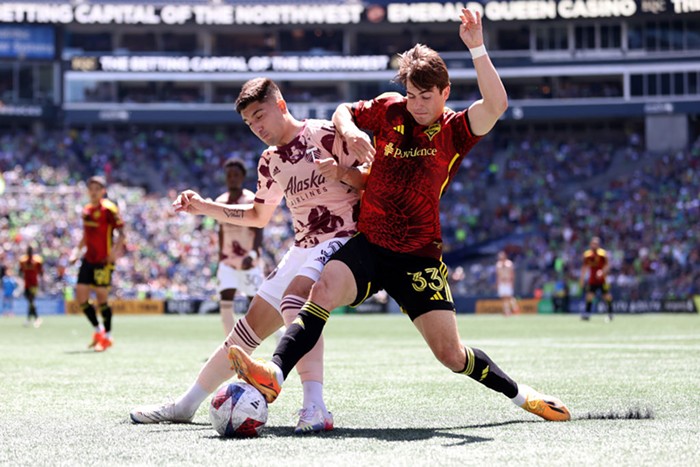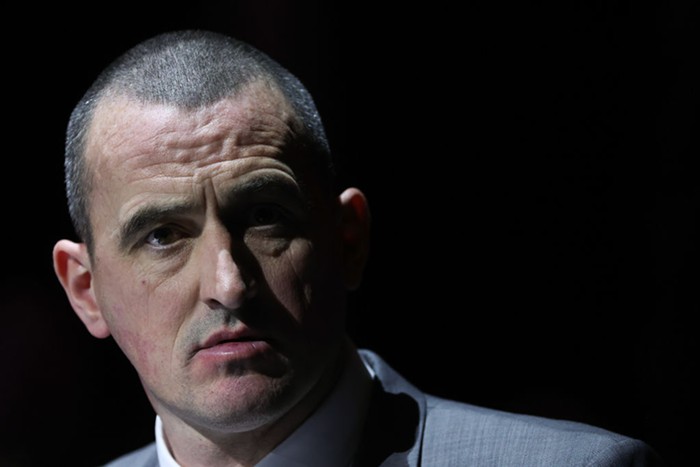THREE-TENTHS of a second is all the time it takes to catch and get a shot off in the NBA. For their final play on Friday night, May 2, at the Moda Center—after falling behind by two points to the Houston Rockets and on the brink of playing a series-deciding game on the road—the Portland Trail Blazers had three times that amount.
There's no need to recount "The Shot": not Damian Lillard springing free and finding himself wide open behind the three-point line, not Lillard rising as Chandler Parsons desperately tried to make up ground and get a hand in his face, not the crowd losing its collective shit when the ball found nothing but the bottom of the net. If you live in Portland, chances are you've already watched the clip a dozen times. That lasting image is already ingrained into this city's subconscious.
Time and time again, Lillard has proven himself worthy during crunch time. Just this season there was the deep pull-up three in Cleveland and the drive-spin-fade-away combo in Detroit, both game winners to seal victories for the Trail Blazers. If there is such a thing as a clutch gene, Lillard has it.
But Friday's shot? This was something different. This was a Game Winner. When people reference this shot in the future, they will do so with a reverence that only the greatest plays in basketball history enjoy: Michael Jordan versus Byron Russell, Ray Allen in game six of last year's finals, Magic Johnson's baby hook. People will remember where they were when Lillard sent the Trail Blazers to the second round of the playoffs for the first time in 14 years. The Moda Center holds 20,000 people, but all of Portland will remember being there last Friday night.
People will remember this shot, just like they remember when Brandon Roy sunk a 30-footer from nearly the same spot on the court. Roy's shot is replayed with regularity, a miraculous bomb that also defeated these same Houston Rockets. But Roy's shot came in the doldrums of the NBA season, a highlight only truly appreciated in retrospect—the eyes of the city weren't on Roy when he sunk his game winner. His shot is a folk tale spread through whispers, a fading memory of his brief greatness. Lillard's shot came with the entire city watching, willing the Trail Blazers to victory, an explosion that demanded to be witnessed. Roy's shot is iconic, but Lillard's shot is already immortal.
There are moments that transcend basketball, moments that move beyond the court and into the collective narrative of a city's history. For Portland, Lillard did just that. This isn't just about winning a basketball game. This is about a city's identity. A shot that builds a community. Everybody wants to share and enjoy this moment, Lillard's name at the tip of everyone's tongue. This is ours. We are Rip City.
After the shot fell, and once the hysterical Moda Center crowd was done crying and hugging and high-fiving, Lillard made his way toward the arena's public address mic. He let out a cathartic scream of "Rip City," finally breaking his stoic character with the weight of the moment lifted off his shoulders.
It's his adopted home city, Portland. When the game was over and there was nothing left to say, Lillard gave respect to the place that now considers him one of their own. He earned it. His stamp will forever be on the city of Portland, and the city will forever be grateful for his heroics.
By the time you read this, the Blazers will be onto their next series against the San Antonio Spurs. There will be new narratives, new storylines, new professional analysis. Nobody expects this season to end with a championship for the Blazers—but at this moment, that doesn't matter. What matters is that, in nine-tenths of a second, Lillard gave this city a rallying cry. He lifted this team higher than anyone expected. He left no doubts.















